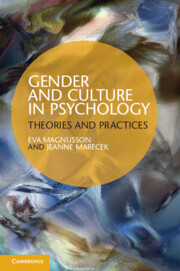Book contents
- Frontmatter
- Contents
- Preface
- 1 Gender and culture in psychology: a prologue
- 2 Categories and social categorization
- 3 Laying the foundation
- 4 Theories of gender in psychology: an overview
- 5 A turn to interpretation
- 6 Doing interpretative psychological research
- 7 Discursive approaches to studying gender and culture
- 8 Gender and culture in children's identity development
- 9 Identity and inequality in heterosexual couples
- 10 Coercion, violence, and consent in heterosexual encounters
- 11 Women's eating problems and the cultural meanings of body size
- 12 Psychological suffering in social and cultural context
- 13 Feminism and gender in psychotherapy
- 14 Comparing women and men: a retrospective on sex-difference research
- 15 Psychology's place in society, and society's place in psychology
- References
- Index
8 - Gender and culture in children's identity development
Published online by Cambridge University Press: 05 June 2012
- Frontmatter
- Contents
- Preface
- 1 Gender and culture in psychology: a prologue
- 2 Categories and social categorization
- 3 Laying the foundation
- 4 Theories of gender in psychology: an overview
- 5 A turn to interpretation
- 6 Doing interpretative psychological research
- 7 Discursive approaches to studying gender and culture
- 8 Gender and culture in children's identity development
- 9 Identity and inequality in heterosexual couples
- 10 Coercion, violence, and consent in heterosexual encounters
- 11 Women's eating problems and the cultural meanings of body size
- 12 Psychological suffering in social and cultural context
- 13 Feminism and gender in psychotherapy
- 14 Comparing women and men: a retrospective on sex-difference research
- 15 Psychology's place in society, and society's place in psychology
- References
- Index
Summary
For cultural psychologists and discursive psychologists, there is no such thing as just “a child.” What it means to be “a child” is always dependent on both the immediate context and the larger context. Moreover, many psychologists who are interested in gender issues prefer to talk about “boys” and “girls” rather than “children.” In most societies, a child's sex categorization plays a decisive role in his or her life, although its specific influences depend on the local situation. In this chapter, we describe research by cultural psychologists concerning such influences on girls and boys as they move from childhood to young adulthood.
Cultural psychologists and discursive psychologists who study children and childhoods have been especially interested in children's identity development and social development. Such psychologists take it as given that the ideals and developmental goals for children are organized and negotiated within specific societies and historical epochs (DeLoache and Gottlieb, 2000; Gulbrandsen, 2006a). They have investigated the cultural logics of childrearing, asking what kind of child do different cultures and subcultures strive to produce. Such researchers often compare different social groups or different cultures, or they study the socialization of boys as compared to girls.
- Type
- Chapter
- Information
- Gender and Culture in PsychologyTheories and Practices, pp. 86 - 97Publisher: Cambridge University PressPrint publication year: 2012



